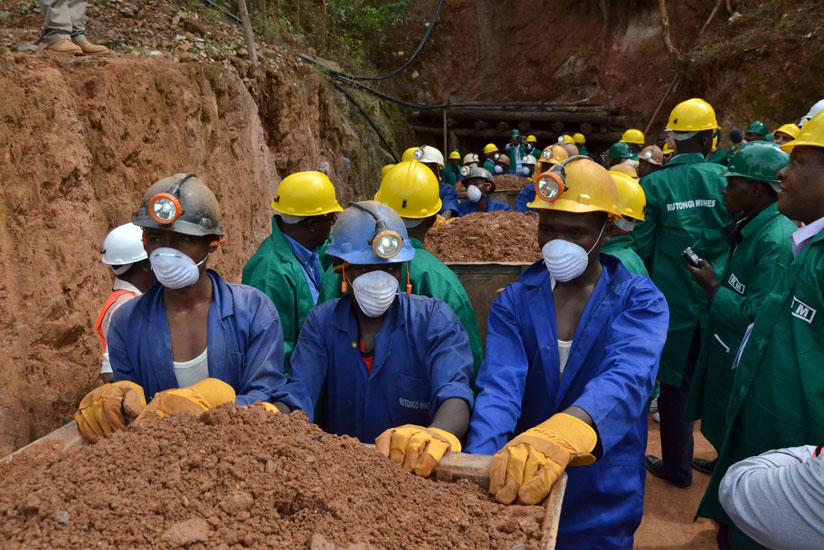Countries in the East African Community (EAC) must improve their governance systems, but above all, have tough laws and policies that jealously guard their abundant mineral wealth, a consultant has told regional lawmakers.


Countries in the East African Community (EAC) must improve their governance systems, but above all, have tough laws and policies that jealously guard their abundant mineral wealth, a consultant has told regional lawmakers.
This was stressed Friday during a validation workshop in Kigali aimed at discussing, among others, model contracts on the EAC mining law with a view of enriching its draft before it goes through the legislative process in the regional Assembly.
Martin Ayisi, an international mining law consultant, emphasised that: "When we improve our governance system, we’ll go a long way.”
Chile and Botswana, he said, are the only developing world countries with a successful mining story, and it is all centred on their level of governance. The biggest producer of copper in the world is Chilean state-owned company, Codelco.
"Board members are appointed by the president and once they are appointed, it’s hands off. The success story of Chile is about governance. But, we had state mines in Ghana and Zambia, and what happened? They were mismanaged,” Ayisi said.
"Botswana are the same people like you and I; Africans. If you look at their corruption index, they are among the top 40 and the least corrupt in Africa”.
Kenya’s 2006 law, he noted, was modeled on the defective Ghanaian model.
"My advice is; don’t repeat the same mistake of other countries.”
Pointing to what went wrong in his native Ghana in the past, Ayisi told the session that if the right policies and people were not put in place, "and then, we did not actually understand what we want.”
"All our policies and laws were externally generated! That’s where the mistake starts from. Things went wrong because we got our laws and policies wrong.”
MP Valerie Nyirahabineza (Rwanda), the chair of the East African Legislative Assembly Committee on Agriculture, Tourism and Natural Resources (ATNR), said that while 24 per cent of the world’s agricultural land is in Africa and 40 per cent of the world’s mineral resources lie under African countries, the endowment has not been translated into sustained, pro-poor development across the continent.
Explaining why her committee chooses to focus on issues of agriculture and mining, she stressed that despite substantial economic growth, "poverty remains high in many African countries and the critical conditions for translating resource wealth into economic and social wealth remain a concern.”
"Sometimes we should be bold enough to take strong measures,” Ayisi said, pointing to the situation in Zimbabwe where the government reportedly made it mandatory for foreign companies to set up a smelter instead of exporting raw platinum to South Africa for processing.
Ayisi stressed that policy makers in the region also need to draw lessons from Indonesia another country "really giving foreign investors a hard time” so that it is not cheated.
Like the others, MP Jeremie Ngendakumana (Burundi) worries that western mining companies enter the continent for money-spinning deals once the ground has been prepared for them by reforms pushed by the International Monetary Fund (IMF) and the World Bank.
Ngendakumana said: "We have to think twice and know exactly where to go and how. It is not enough to have good laws since we can have a good tool that isn’t put to use.”
The global mining industry, participants at meeting agreed, was "a mafia industry” where corrupt African governments make "secret deals” with foreign companies and people would be outraged if they knew what is going on.
In Tanzania, President John Magufuli has reportedly read the riot act to foreign investors in Africa’s fourth top gold producer, telling them to pack and go if they do not get their act together. Noting that the country has many minerals that are not contributing to the economy, Magufuli has reportedly insisted on a re-examination of mining laws and policies intent on ensuring that mining companies pay taxes.
Mining experts say the country whose gold exports alone earned $1.27 billion in 2015 – down from $1.32 billion the previous year – has not fully benefited from its mineral wealth because of poor contracts and laws as well as lack of transparency as companies are said to falsify production and profit figures.
Ayisi, however, stressed that there should be no problem with the notion of state-owned mines as long as the people in charge are "the right people.” And, he noted, EAC countries are not short of people with required knowledge and expertise.
The draft EAC mining law, he said, hovers around all critical areas where problems have been lingering. These areas include; licensing and permitting, access to information and transparency, mineral resources development and land access, as well as employment and training.
editorial@newtimes.co.rw


